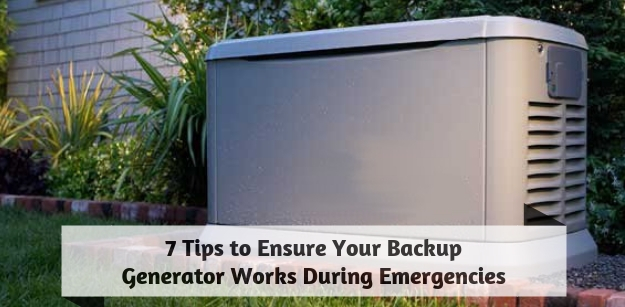Whether for personal or business needs, the role of a backup generator cannot be overstated. In most cases, a backup generator is considered to be a lifesaver, more so due to its ability to satisfy varying power needs during power outages. However, since power outages are not too common, most of us are often caught off guard when the need for a using a generator arises. The below tips will help ensure your back up generator works well during emergencies.

1. Get the right size capacity
As is obvious, the main purpose of a generator is to provide back-up power in the event of blackouts. Therefore, to ensure you get the most out of your back up generator, it is necessary to calculate your average power needs. Almost every home appliance contains labels that indicate wattage information. Use the wattage information to calculate your estimated power needs. Once you have added all the wattages of your home appliances, you should multiply the total by 1.5 to ensure you factor in the extra power required to start. Failure to purchase the right capacity can lead to disappointments since a low capacity generator cannot serve a house with high wattage demands.
2. Have more than enough oil
When using a generator, it is crucial to note that on-site fuel is mandatory. Depending on the make, back- up generators can run on a host of fuels including diesel, propane and even natural gas. Therefore, to prevent disappointment in the event of a black out, ensure you have more than enough fuel to run your generator. Generators are known for their high fuel consumption, and as a result, it is necessary to ensure that you have enough oil to withstand a long power outage. Also, due to the high energy demands when starting, having extra fuel supplies will ensure your generator can successfully power your electrical appliances.
3. Proper Installation
Regardless of your experience or know-how in setting up generators, it is advisable to seek the services of a licensed professional. Generators vary depending on use and capacity. The higher the capacity of your back up generator, the more complicated the installation process will be. Incorrect installations can not only damage your generator but also increase the risk of fire or electrocution. As a result, it is wise to outsource the installation of your back up generator to licensed experts. Conducting regular check-ups on your generator`s wiring and installation will help increase your preparedness in the event of a power outage.
4. Plan for regular maintenance
Remember, your back up generator will be unused more times than it will actually be put to use. To ensure your generator is ready for use when the need arises, scheduling regular filter and oil changes is recommended. An unresponsive back-up generator can greatly affect you during an emergency. Therefore, you should prioritize regular maintenance and inspection to ensure your generator is still functional even when not in use. Without regular maintenance, even the highest quality generators become damaged over time. As a result, it is advisable to seek professional assistance every once in a while, more so when your generator has been out of use.
5. Regularly check up your load
Although you might have checked your overall wattage at the time of purchasing your generator, it is necessary to check on your electrical load regularly. Purchasing new electronic equipment can lead to an overload in the event of a blackout. Unfortunately, overloads more often than not lead to unwanted outcomes such as damage to the generator and even other household equipment. Thus, always check on wattage properties whenever you make new electronic purchases. Once you have calculated the overall wattage, ensure you assess whether the new wattage requirements are manageable by your generator. Most people tend to purchase new equipment without considering the overall wattage. If you intend to use your backup generator in the event of an emergency, it is necessary to ensure you regularly check your load to prevent overworking your generator.
6. Chose a strategic location
Contrary to popular belief, the performance of a generator is greatly reliant on its location. Setting up your generator in an area prone to high winds or floods during bad weather only increases its chances of malfunctioning during emergency. A sheltered, outdoor location that is well above ground level is recommended for your generator. By placing your backup generator outside, you reduce the chances of carbon monoxide build up which is life threatening. Also, sheltering your generator prevents the risk of destruction through strong winds. Therefore, before purchasing a generator, ensure you locate a strategic location for setting up your new device.
7. Understand your generator’s properties
As obvious as it may sound, you will need to take time to understand your generator and how it works. Among the most important details to comprehend is safety information. In the generator market, most brands such as Honda generators come with user manuals and safety instructions that usually come in handy in the event of emergencies. Ensure that you have enough information on what to do in case your device malfunctions. It is advisable to go for brands that can be serviced locally as they can be repaired immediately they are damaged. Moreover, it is prudent to read on the appropriate working conditions of your generator. Since generators come in different makes and designs, you should take enough time to know the pros and cons associated with your device. Be sure to understand your generator`s power limit and performance capabilities as having such information will prevent you from overloading your device.



